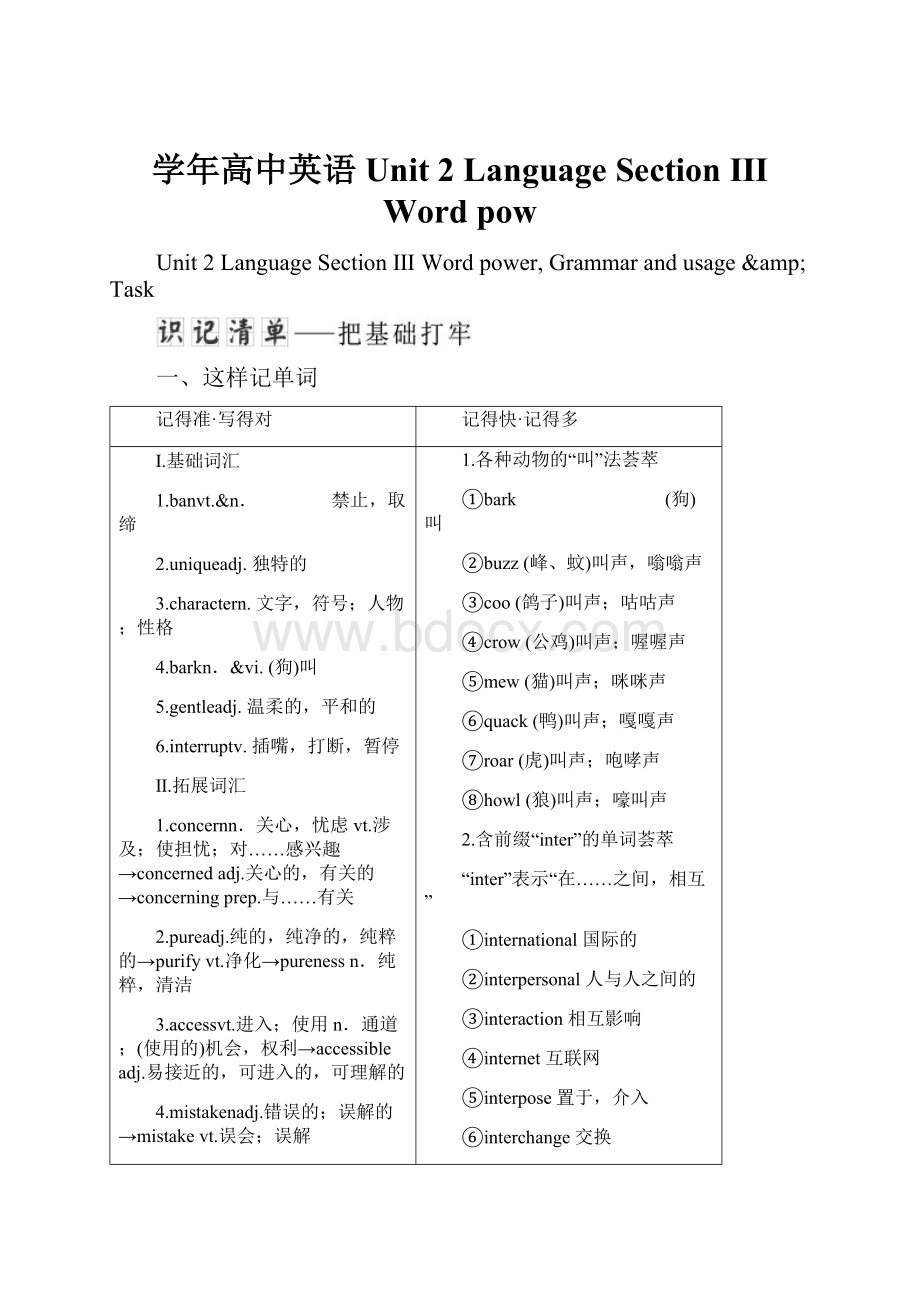学年高中英语 Unit 2 Language Section Ⅲ Word pow.docx
《学年高中英语 Unit 2 Language Section Ⅲ Word pow.docx》由会员分享,可在线阅读,更多相关《学年高中英语 Unit 2 Language Section Ⅲ Word pow.docx(19页珍藏版)》请在冰豆网上搜索。

学年高中英语Unit2LanguageSectionⅢWordpow
Unit2LanguageSectionⅢWordpower,Grammarandusage&Task
一、这样记单词
记得准·写得对
记得快·记得多
Ⅰ.基础词汇
1.banvt.&n. 禁止,取缔
2.uniqueadj.独特的
3.charactern.文字,符号;人物;性格
4.barkn.&vi.(狗)叫
5.gentleadj.温柔的,平和的
6.interruptv.插嘴,打断,暂停
Ⅱ.拓展词汇
1.concernn.关心,忧虑vt.涉及;使担忧;对……感兴趣→concernedadj.关心的,有关的→concerningprep.与……有关
2.pureadj.纯的,纯净的,纯粹的→purifyvt.净化→purenessn.纯粹,清洁
3.accessvt.进入;使用n.通道;(使用的)机会,权利→accessibleadj.易接近的,可进入的,可理解的
4.mistakenadj.错误的;误解的→mistakevt.误会;误解
5.embarrassvt.使尴尬,使难堪→embarrassedadj.尴尬的,陷入困境的→embarrassingadj.令人尴尬的→embarrassmentn.窘迫,尴尬
6.conclusionn.结论,推论→concludev.推论,推断
7.racialadj.人种的,种族的→racen.人种,种族
8.backwardsadv.向后;向反方向→forwardsadv.向前,向前方
9.customn.风俗,习俗→customern.顾客
1.各种动物的“叫”法荟萃
①bark (狗)叫
②buzz(峰、蚊)叫声,嗡嗡声
③coo(鸽子)叫声;咕咕声
④crow(公鸡)叫声;喔喔声
⑤mew(猫)叫声;咪咪声
⑥quack(鸭)叫声;嘎嘎声
⑦roar(虎)叫声;咆哮声
⑧howl(狼)叫声;嚎叫声
2.含前缀“inter�”的单词荟萃
“inter�”表示“在……之间,相互”
①international国际的
②interpersonal人与人之间的
③interaction相互影响
④internet互联网
⑤interpose置于,介入
⑥interchange交换
3.以“mis�”为前缀的词集汇
①mistake 误会,误解 ②mislead 误导
③misfortune不幸④mistreat虐待
⑤misunderstand误解⑥misuse滥用
4.语境巧记embarrass派生词
Tomyembarrassment,IrealizedthatItookhisbagbymistake.Thatembarrassingsituationreallyembarrassedme.
令我尴尬的是,我意识到我错拿了他的包。
那种令人尴尬的情形真的使我很尴尬。
二、这样记短语
记牢固定短语
多积常用词块
1.lookupto 尊敬,尊重
2.lookforwardto盼望
3.take...intoconsideration把……考虑在内
4.lookup抬头看;(在字典或参考
书中)查找
5.resultin导致
6.dueto由于
7.beupto由……负责
8.concentrateon集中注意力于
9.makefunof取笑
10.holdup举起;延误
11.inconclusion最后
12.inaword总之,一句话
13.leaveout遗漏;不考虑,忽视
14.oughtto应当,应该
1.handlethisproblem 处理这个问题
2.stoppeoplefromlittering阻止人们乱扔垃圾
3.thinkaboutmysuggestions考虑我的建议
4.borrowedwords外来词
5.showgreatconcernfor...对……表现出极大关心
6.washthedishes洗碗
7.takephotoofyou给你拍照
8.makeothersembarrassed让别人感到难堪
9.awasteoftime浪费时间
10.usedtodosth.过去常常做某事
11.achallengingtask一个挑战性的工作
三、这样记句式
先背熟
再悟通
后仿用
1.TherearemanysituationsineverydaylifewhereinformalEnglishisallowedorevenpreferred...
在日常生活中有许多场合可以使用非正式英语,非正式英语甚至更受欢迎……
where引导的是限制性定语从句,其先行词是抽象名词。
Noiseiscomingtothepointwherewecan'tputupwithit.
噪音快到我们无法忍受的地步了。
;
2.Whenyouarelateforasmallmeeting,thereisnoneedtosay‘sorry’.
当你开小会迟到时,没有必要说“抱歉”。
thereisnoneedforsb.todosth.“某人没必要做某事”。
Everythingisfinewithme;there_is_no_needforyoutobeconcerned.
一切都好,你不用牵挂。
3.Itseemsthatifpeoplelearnsomethingaboutotherculturesbeforetheyvisitanewcountry...
看起来好像人们如果在参观一个新国家之前学习一些关于其他文化的知识……
Itseemsthat...“似乎……”。
It_seems_thatyoungpeoplearemoreinterestedinpopmusic.
年轻人似乎对流行音乐更感兴趣。
1.(教材P28)Wecannotleaveoutthequestionwordsinnounclauses.
在名词性从句中,我们不能漏掉疑问词。
leaveout遗漏,删去;不考虑,忽视;不包括,不提及
leavefor 动身前去
leavealone不管,不理,不干涉
leaveaside不予考虑,搁置一边
leavebehind留下,落下,遗忘
①Incopyingthisdocument,becarefulnottoleaveoutanywords.
抄写这个文件时,当心不要漏掉任何字句。
②Marytalkedtotheshygirlsothatshewouldn'tfeelleft(leave)out.
玛丽和那位害羞的姑娘交谈,以免让她觉得没人理她。
③LucywillleaveforBeijingonbusinessinthreehours.
露茜将于三个小时之后动身出差去北京。
④Letusleaveasidethequestionofcostsforthemoment.
我们暂且不谈费用的问题吧。
2.(教材P29)KingHenryⅦwasapoetwhoshowedgreatconcernforlanguage.
国王亨利七世是一位非常关注语言的诗人。
concernn.关心;忧虑,担心;关系vt.涉及;使担忧
(1)concernfor/about... 对于……的担心
(2)concernoneselfwith/about关心;忙于;从事
(3)concernedadj.有关的;担心的
beconcernedwith...与……有关,涉及……
beconcernedabout/for/that...关心……,担心/忧……
so/asfaras...beconcerned就……而言
(4)concerning(=about)prep.关于
①Myconcernisthatmyspellingandaccentwillconfusethem.
我担心我的拼写和口音将会使他们感到困惑。
②Somepeopledon'tshowmuchconcernfor/aboutourenvironment.
有些人不太关心我们的环境。
③Sheconcernedherselfabout/withherson'sillness.
她担忧她儿子的病。
④Peopleallovertheworldare_concerned_about/fornuclearpollution.
全世界的人都关心核污染。
⑤Wereadstoriesconcerning(concern)visitorsfromouterspace.
我们读了关于外来太空访客的故事。
3.(教材P29)Atonetimethedepartmentbannedsome‘borrowedwords’fromEnglish,including‘weekend’and‘email’.
政府曾经禁用一些英语外来词,包括weekend和email.
banvt.&n.禁止;取缔
abanon(doing)sth. 禁止(做)某事
bansb.fromdoingsth.禁止某人做某事
①Chemicalweaponsarebannedinternationally.
国际上禁止使用化学武器。
②Thereisabanonsmokinginpetrolstations.
加油站禁止吸烟。
③Officialshavebeenbannedfromdrinkingatlunchtime.
禁止政府官员中午喝酒。
[名师点津] 你还学过哪些意为“禁止/阻止某人做某事”的表达?
①forbidsb.todosth.
②prevent/stop/keepsb.fromdoingsth.
4.(教材P29)Today,thespreadof‘borrowedwords’ismostlyduetotheeasilyaccessedInternetandtelevisionprogrammesfromacrosstheworld.
今天,“借用词”的传播主要得益于容易应用的因特网和遍及世界的电视节目。
dueto由于,因为
表示“因为,由于”的表达式:
(1)从属连词:
as,since,because
(2)并列连词:
for
(3)介词短语:
dueto,owingto,becauseof,thanksto,asaresultof,onaccountof
①Yourfailurewasduetonothingbutyourowncarelessness.
你的失败正是由于你自己的粗心大意。
②Changesintheclimateareduetopollutionoftheatmosphere.
由于大气层的污染而造成了气候变化。
③Hecannotgotoschoolbecauseofhissickness.
他因病不能上学。
accessvt.进入;使用n.通道;(使用的)机会
(1)gain/obtain/get/haveaccessto... 得以接近/进入/使用……
giveaccessto...使能接近……
(2)accessibleadj.可接近的;可进入的;可使用的;容易理解的
beaccessibletosb.易被某人所接近/使用/进入
①Youcanaccesstheinformationanywhereifyouhaveacomputer.
如果有一台电脑,你在任何地方都可以获得信息。
②Studentsmusthaveaccesstotheelectricresources.
学生必须有机会使用电子资源。
③Shehasmadesomeattempttomakeoperaaccessible(access)toawiderpublic.
她曾尝试着让歌剧走近更广大的大众。
5.(教材P31)Theyhavenolettersorcharacters.
它们没有字母和文字。
charactern.(书写或印刷)文字,符号;人物;性格,品质
incharacter 适合;相称
outofcharacter不符合某人的性格;不适合,不相称
build(up)character磨炼性格
shapeone'scharacter塑造性格,形成个性
①IfItakecareofmycharacter,myreputationwilltakecareofitself.
注意好品行,自有美名声。
②Hiswordsareentirelyincharacterwithhisactions.
他言行完全一致。
③Herbehaviourlastnightwascompletelyout_of_character.
她昨晚的举止与她的性格截然相反。
④Hardworkingconditionscanbuild_(up)_character.
艰苦的工作条件能磨炼人的性格。
⑤Childhoodexperiencesoftenplayabigpartinshapingone'scharacter.
童年的经历在形成一个人的性格方面往往起重要作用。
[语境串记] HedescribedthecharacterofthecharacterheplayedwithtwoChinesecharacters.
他用了两个汉字来描绘他所扮演的角色的性格。
6.(教材P35)Sheismakingfunofyouandtryingtoembarrassyouintotryingharder.
她在取笑你并尽力让你知耻而后勇。
embarrassvt.使尴尬,使难堪
(1)embarrasssb.withsth. 因某事使某人尴尬
(2)embarrassedadj.窘迫的;尴尬的,不好意思的
feel/beembarrassedabout/at 对……感到尴尬
embarrassingadj.令人窘迫的,使人难堪的
(3)embarrassmentn.困窘,尴尬
①MrBlakeembarrassedmewiththedifficultquestionIcouldnotanswer.
布雷克先生问我不能回答的难题,使我很尴尬。
②Allthepeoplefixedtheireyesonme,whichmademefeelveryembarrassed(embarrass).
所有的人都把目光盯着我,使我很尴尬。
③Ifeltembarrassedabout/athowuntidythehousewas.
我对家里这么乱感到难为情。
④Iwasintheembarrassing(embarrass)positionofhavingcompletelyforgottenhername.
当时我完全忘记了她的名字,很是尴尬。
⑤Hewasalwayscarefultoavoidembarrassment(embarrass).
他总是小心谨慎地避免尴尬。
7.(教材P36)Inconclusion,weneedtoknowthecustomsofacountrysothatwedonotmakeothersembarrassedorannoyed.
总而言之,我们需要了解一个国家的风俗习惯,这样我们就不会让别人感到尴尬或恼火。
conclusionn.结论;推论;结尾,结束
(1)inconclusion 最后,总之,综上所述
cometo/arriveat/reach/drawaconclusion得出结论
(2)concludev.推论,推断出;终止,结束
concludefrom...从……中得出结论
conclude(...)with以(……)结束……
①Ifoundtheconclusionofhisbookveryinteresting.
我觉得他这本书的结尾很有趣。
②Inconclusion,Iwouldliketothankeveryonewhoisalwaysforme.
最后,我想感谢长期以来一直支持我的每一个人。
③Theyarrivedataconclusionafterseverallongdiscussions.
经过数次长时间的讨论之后,他们终于得出了结论。
④Hehascometoaconclusionthathisfuturedependsonhimselfalone.
他得出一个结论,自己的未来只能依靠自己。
⑤Heconcluded_fromtheirremarksthattheywerenotinfavoroftheplan.
他从他们的话语中推断出他们不赞成这个计划。
8.(教材P36)Saying‘sorry’ifweinterruptordisagreewithsomeonealsohelpsustobepolite.
如果我们打断或不同意某人的意见时说“对不起”也有助于使我们看起来有礼貌。
interruptvi.&vt.插嘴,打断,暂停,使中断
(1)interruptsb./sth.(with) (以……)打断某人/某事
(2)interruptionn.打扰,插嘴
withoutinterruption连续的,不断的
①Thenoiseinterruptedusinourconversation.
噪音打断了我们的谈话。
②Hewasangryatbeing_interrupted(interrupt)withsuchsillyquestionsinhisspeech.
他对在他演讲时被这样愚蠢的问题打断而生气。
③Shehaskeptupphysicaltrainingforseveralyearswithout_interruption.
她坚持身体锻炼,多年来从未间断。
9.(教材P37)Wealsooughttoshowduerespectforpeopleolderthanus.
我们也应当向比我们年龄大的人表现出恰当的敬意。
oughtto(=should)应该,应当
oughtto/shouldhavedone本该做而实际上未做
oughtnotto/shouldn'thavedone本不该做而实际上做了
①Sheoughttodowellinherstudiesthisyear—she'sveryfocused.
今年她的功课应该学得好,她的注意力很集中。
②Weoughttobeheadingbackifwewanttoreachhomebeforedark.
如果我们想天黑前到家,现在该往回走了。
③Yououghtnottohave_taken(take)thebookoutofthereadingroom.
你本不应该把书带出阅览室。
④—Oughtweto_do(do)itatonce?
—Yes,yououghtto.
——我们应该马上做吗?
——是的,应该。
[名师点津] oughtto表示义务和责任,没有人称和数的变化,口语中多用should,后接动词原形。
否定句中用oughtn't,疑问句为Ought...todo...?
1.TherearemanysituationsineverydaylifewhereinformalEnglishisallowedorevenpreferred,forexample,whileplayingsportsormeetingfriendsataparty.
在日常生活中有许多场合可以使用非正式英语,非正式英语甚至更受欢迎,比如,在进行体育运动或朋友聚会时。
句中where引导定语从句,先行词situations和定语从句被ineverydaylife隔开了。
where引导定语从句时,其先行词常为表示地点的名词,但在某些情况下,先行词也可以是某些抽象名词,如situation(处境),case(情况),point(地步),stage(阶段)等。
①若定语从句的引导词在从句中作地点状语,则引导词用关系副词where,where可用“相应的介词+which”替换;
②若引导词在从句中作主语或宾语,则引导词用that/which。
①Canyouthinkofasituationwherethisidiomcanbeused?
你能想出一个使用这个成语的情况吗?
②Wehavereachedapointwhere_a_change_is_needed.
我们已经到了必须改一改的地步。
③Today,we'lldiscussanumberofcaseswherebeginnersofEnglishfailtousethelanguageproperly.
今天,我们将讨论许多英语初学者对英语使用不当的情况。
2.Whenyouarelateforasmallmeeting,thereisnoneedtosay‘sorry’.
当你开小会迟到时,没有必要说“抱歉”。
句中thereisnoneedtodosth.表示“没